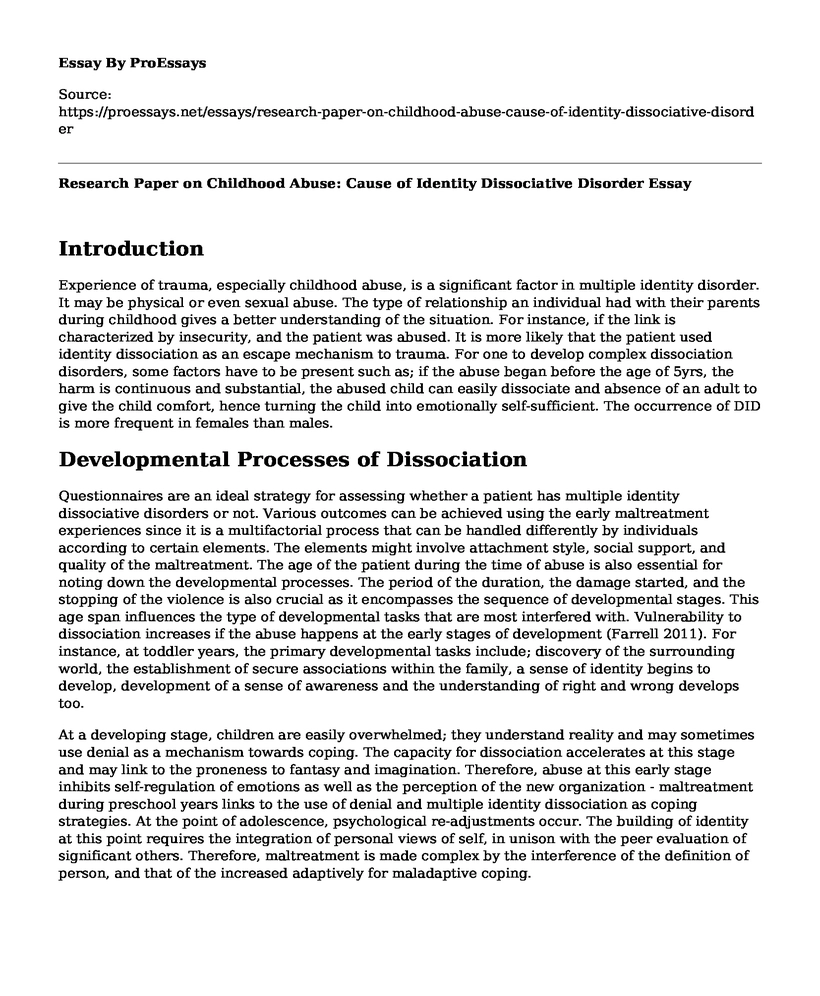Introduction
Experience of trauma, especially childhood abuse, is a significant factor in multiple identity disorder. It may be physical or even sexual abuse. The type of relationship an individual had with their parents during childhood gives a better understanding of the situation. For instance, if the link is characterized by insecurity, and the patient was abused. It is more likely that the patient used identity dissociation as an escape mechanism to trauma. For one to develop complex dissociation disorders, some factors have to be present such as; if the abuse began before the age of 5yrs, the harm is continuous and substantial, the abused child can easily dissociate and absence of an adult to give the child comfort, hence turning the child into emotionally self-sufficient. The occurrence of DID is more frequent in females than males.
Developmental Processes of Dissociation
Questionnaires are an ideal strategy for assessing whether a patient has multiple identity dissociative disorders or not. Various outcomes can be achieved using the early maltreatment experiences since it is a multifactorial process that can be handled differently by individuals according to certain elements. The elements might involve attachment style, social support, and quality of the maltreatment. The age of the patient during the time of abuse is also essential for noting down the developmental processes. The period of the duration, the damage started, and the stopping of the violence is also crucial as it encompasses the sequence of developmental stages. This age span influences the type of developmental tasks that are most interfered with. Vulnerability to dissociation increases if the abuse happens at the early stages of development (Farrell 2011). For instance, at toddler years, the primary developmental tasks include; discovery of the surrounding world, the establishment of secure associations within the family, a sense of identity begins to develop, development of a sense of awareness and the understanding of right and wrong develops too.
At a developing stage, children are easily overwhelmed; they understand reality and may sometimes use denial as a mechanism towards coping. The capacity for dissociation accelerates at this stage and may link to the proneness to fantasy and imagination. Therefore, abuse at this early stage inhibits self-regulation of emotions as well as the perception of the new organization - maltreatment during preschool years links to the use of denial and multiple identity dissociation as coping strategies. At the point of adolescence, psychological re-adjustments occur. The building of identity at this point requires the integration of personal views of self, in unison with the peer evaluation of significant others. Therefore, maltreatment is made complex by the interference of the definition of person, and that of the increased adaptively for maladaptive coping.
Difficulty in Diagnosing
- There are various explanations and reasons for low rates for dissociative disorders diagnosis. They may include:
- Failure of GPs and mental health professions to ask the right questions during an assessment.
- Most symptoms noted during routine mental health checkups such as anxiety and insomnia are also prevalent in other mental health issues.
- Most of the people facing dissociative identity disorders tend to conceal others from finding out.
Diagnosis
Diagnosis comprises the assessment of signs usually and ruling out any therapeutic condition that could result in the symptoms. This type of evaluation may include a corporal exam, psychiatric test, and analytic measures in the DSM-5. The physical exam involves the process of examination by a doctor using deep questions, a review of the symptoms in association with personal history (Gentile, Dillon & Gillig 2013). Some of the tests may discard physical conditions such as brain disease and a head injury, which could result in memory loss. The psychiatric exam, on the other hand, involves assessment of the mental health status. The mental health professional inquires about a patient's thoughts, feelings, and behaviors concerning the current symptoms. The professional may also need extra information from other family members and close people. While steering the analytic standards in the DSM-5, the psychological health expert may relate the signs to the rules for analysis in the Diagnostic and Statistical Manual of Mental Disorders (DSM-5).
For dissociative identity disorder, the DSM-5 states that; there is a display of several identities that may be referred to as in some cultures as a possession, which is, however, involuntary and not wanted. DSM-5 goes further to state that these victims possess openings in memory for daily activities, significant individual statistics, abilities, and upsetting occasions that are too wide-ranging to be explained by usual obliviousness. A patient's symptoms are not part of the most known cultural and religious practice and that the signs are not due to alcohol or other drugs. In children, the symptoms may not be because of imaginary playmates. The signs should also be a reason behind a patient's significant stress or other issues in their affairs and other sectors of their daily lives.
Treatment
Dissociative Identity Disorder can last in a patient for a very long time if left untreated. Treatment may take longer, but it enables the patients to balance emotions after treatment. However, stress and drug or alcohol abuse may root a degeneration of signs at any period. Therefore, for quality care purposes, patients suffering from dissociation identity disorder should be treated by professionals on psychological wellbeing with skills and knowledge concerning dissociation disorders.
Cite this page
Research Paper on Childhood Abuse: Cause of Identity Dissociative Disorder. (2023, Mar 09). Retrieved from https://proessays.net/essays/research-paper-on-childhood-abuse-cause-of-identity-dissociative-disorder
If you are the original author of this essay and no longer wish to have it published on the ProEssays website, please click below to request its removal:
- Research Paper on Anti-Bias Education
- Problem Solution Essay on Homelessness
- Essay Sample on Controlled Substance Identification
- Exploring Displacement and Immigration in Contemporary Art - Essay Sample
- Research Paper on Substance Abuse Programs: Stigma, Weak Leadership, and Problematic Patients
- Essay Example on Debate: Is Studying Law a Guarantee for Success?
- Essay Example on Socialization: The Key to Human Well-Being and Success







